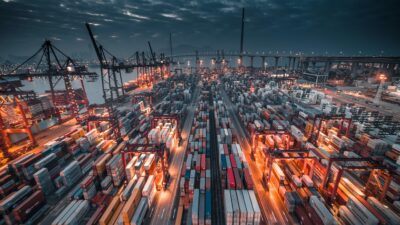This week: building the digital Silk Road, brands in the age of Amazon, and my robot friend. Sandra Peter (Sydney Business Insights) and Kai Riemer (Digital Disruption Research Group) meet once a week to put their own spin on news that is impacting the future of business in The Future, This Week.
The stories this week
Amazon and low price innovation
Other stories we bring up
China inches toward AI supremacy
The coming trade war over data
Amazon and Google are in a bitter feud
The Future, This Week Amazon special
Robot of the week
You can subscribe to this podcast on iTunes, Spotify, Soundcloud, Stitcher, Libsyn or wherever you get your podcasts. You can follow us online on Flipboard, Twitter, or sbi.sydney.edu.au.
Our theme music was composed and played by Linsey Pollak.
Send us your news ideas to sbi@sydney.edu.au.
For more episodes of The Future, This Week see our playlists.
Introduction: This is The Future, This Week on Sydney Business Insights. I'm Sandra Peter. And I'm Kai Riemer. And every week we get together and look at the news of the week. We discuss technology, the future of business, the weird and the wonderful, and things that change the world. Okay let's roll.
Sandra: Today in The Future, This Week: building the digital Silk Road, brands in the age of Amazon, and my robot friend. I'm Sandra Peter, I'm the Director of Sydney Business Insights.
Kai: I'm Kai Riemer, professor at the Business School and leader of the Digital Disruption Research Group. So Sandra what happened in the future this week?
Sandra: Our first story comes from ABC News and it discusses the Fourth World Internet Conference in China where government officials from across China and business leaders from across the world got together to discuss the future of the global digital economy and really the Congress's focus was around the 'Digital Silk Road' a Chinese initiative that would shadow the One Belt, One Road initiative which looks at establishing a physical infrastructure for China to engage in trade around the world. This in turn discusses the digital version of that - building a digital infrastructure for the New Age.
Kai: And the article makes the point that while the Congress has happened previously this year was notably different for a couple of reasons. First there were a number of western business leaders in attendance such as Apple CEO Tim Cook, Google CEO Sundar Pichai, and a number of Facebook executives which gives the whole affair a different significance, a different weight.
Sandra: And we should really know that usually this kind of conference used to be a state run Chinese affair. And right now these companies were present even though many of the services and in some cases all of the services are banned in places like China currently.
Kai: So the article makes the point that the Digital Silk Road initiative is more than just the usual jargon around 'internet is important' and there's the future in all of these kind of things but there's actually something behind it. On the one hand China is building the infrastructure for its large internet companies: the three BAT companies (Baidu, Alibaba and Tencent) and it's paving the way for these companies to engage in markets beyond China. The article makes the point that there is indeed a number of smaller countries that are congregating around China that are making active attempts to connect with these Chinese companies and we've mentioned previously that companies such as Alibaba making inroads into the African markets.
Sandra: So it names Saudi Arabia, Egypt, Turkey, Thailand, Laos, Serbia, and the United Arab Emirates are several of the countries that have agreed to cooperate with China to build this Digital Silk Road.
Kai: So these companies will engage in e-commerce cooperation, in joint policy-making, and in building a transparent digital economy and promote cooperation international standardisation, the article says.
Sandra: So this is a particularly interesting article because it goes beyond the usual narratives that focus on China's attempts at cyber sovereignty where they want to manage and contain their own internet and have full control over what happens on their infrastructure in terms of content that is being disseminated, in terms of companies that have access to it, and tries to have a more in-depth conversation about the future of China's digital transformation. So whilst a lot of the Western media focuses quite often on digital censorship in China we are actually overlooking a lot of initiatives that are trying to shape not only the infrastructure that would allow China to engage with the rest of the world but also its attempts to figure out how to go about having trade agreements, how to go about developing policy with the rest of the world.
Kai: And we also tend to forget that China is already a big part of the digital economy, for example 25 percent of all global Apple App Store earnings are originating from China.
Sandra: And this is indeed while there is this dilemma for companies like Apple and Google and Facebook who do not want to enter a market where they will face censorship a market that is restricted in many ways however the Chinese market is a highly highly lucrative market for these big companies. Last year alone this market was 700 million internet and mostly mobile users and that had grown in that year alone by about 20 percent so indeed a really really big market. And let's not forget the bigger picture. If we look at the past 10 years technology companies have come to dominate world companies by market cap. If we look at the top 10 in the world the top five would be technology companies (American technology companies that is) companies like Apple and Google Alphabet, Microsoft, Amazon and Facebook dominate market value rankings over the last decade. It used to be that we had manufacturing in there, that we had oil companies in there, we had financial companies in there. Now the top five is all tech companies. Increasingly we're starting to see Chinese companies entering that space as well. Companies like Tencent passed Wells Fargo to become the 10th largest company in the world so Tencent is the company that has WeChat, the app that is like WhatsApp, Viber, Facebook, Amazon all rolled into one.
Kai: So what we can see in the company space is that certainly Chinese tech companies are now among the world's largest. But what we want to say is that it's not only in content and services and products that China is starting to catch up and indeed surpass the West in terms of size, it is that China is heavily investing in the kind of infrastructure not only physically under its 'one belt, one road' program but also digitally with the 'Digital Silk Road' initiative. And the point the article makes is that there's a gravitational power shift towards China and the world has talked about this for a while that we're seeing the Asian century, China is growing bigger and bigger, but I think it's worthwhile discussing what they're actually doing when it comes to infrastructure and that they are executing a long term strategy. And I want to point to another article that was published last week in TDW titled 'China inches towards AI supremacy as US continues to ignore science'. This article reports that a U.S. think-tank The Center for a New American Security points out that China is not only going to catch up but actually surpass the US within the next three to five years in the artificial intelligence and machine learning space and that has implications not just for new businesses and services or the way in which governments use these technologies but also for the military and so one point the article makes is that there's a literal arms race underway for better than human machines in the military.
Sandra: So this comes on the back of a couple of decades of technology transfers towards China. Let's remember the US has engaged with Chinese companies, has been engaging in technology transfer in joint ventures...
Kai: And so have many European countries right that wanted entry into Chinese markets. Often they had to set up joint ventures with local companies, collaborate and therefore China has benefited from a lot of technology transfer from western companies.
Sandra: And this has enabled areas like Shenzhen to now innovate in their own right to now actually surpass in terms of supply chain innovation in terms of new products and services and rapid iteration what the companies that had come there in the first place.
Kai: And so the article makes the point that this can be a problem. The researchers from this think-tank point out that the US should mitigate illicit and problematic technology transfers to China which is easier said than done of course.
Sandra: Another point raised by this article was that there needs to be adequate funding and investment for research and development into these areas. And we've discussed this before. The US federal government only invested about sixty seven billion dollars in nonmilitary research over the past year and only about 1 billion in unclassified artificial intelligence research whilst the big tech companies have been investing very heavily 60 billion dollars in research and development. In China we're seeing huge support by the government for these companies and especially the BAT companies (Baidu, Alibaba and Tencent) to develop and actually encourage the development of such technologies.
Kai: So as a third point besides technology transfer and infrastructure investments is that the article says the US needs to step up its game investing in education and talent where China has been very good at building its engineering disciplines in universities, building its universities as such but also sending abroad large numbers of students who return to China well-educated whereas in the US the education system has been struggling. So the point that we want to discuss is that in the U.S. it seems to be left to the private sector, to corporations, to invest in technologies and also often to build skills and develop talent whereas China is able to execute these strategies on longer timeframes at the state level.
Sandra: So taking a step back we need to recognise that this Fourth Industrial Revolution will be enabled by technology companies and in order for these technology companies to actually enable the economic benefits that we have all come to expect from them they will require two things: they will first require a global infrastructure on which to deliver these services and let's remember companies like Facebook have 87 percent of their customers outside of the US. Companies like Twitter have almost 80 percent of their customers outside the US. So we will require a global infrastructure for this. But we will also require a range of laws, policies, trade agreements by which to navigate the way in which we transfer data for instance across borders. There are currently no international rules that govern such movements of information and of data. China is actually making inroads into both of these things with the Digital Silk Road. It's looking both at physical infrastructure at enabling broadband access to these services and at developing trade agreements and other joint policies that would affect how companies share information across the world how they deliver digital services across the world and how they store their data across the world.
Kai: And of course if we look at the ability to build the actual infrastructure to enable this digital revolution, the West doesn't have the best track record. Both the US and also in Australia we're struggling to actually understand the significance of and build large scale infrastructure projects. Take for example the NBN (the National Broadband Network)...
Sandra: One of the recurring topics on The Future, This Week.
Kai: It seems that Western societies with their political systems find it incredibly hard to think in longer timeframes. So a lot of the narrative around the rollout of the NBN was that it wasn't fast enough and people tried to speed it up and they compromised on the actual technology. And so what we get now is a substandard technology slightly faster but in the long run probably not with the kind of speed and quality that we need to underpin the emerging digital economy but even more importantly we tend to forget that these infrastructure projects are actually infrastructure so we treat them as projects and as if they were privately owned products. So for example the technologies for the NBN were judged on a cost benefit analysis where you know consumers were asked about their willingness to pay for the service. It's structured such that the NBN has to earn back the money for its rollout which tends to forget that these infrastructures are there as a basis for developing new services, for enabling an entire economy, and by way of dealing with them in that way and judging them that way we often tend to favour the more conservative solution we end up with more complexity, less speed, and something that is in the end substandard. China seems to operate differently - it operates on a longer timeframe and within a more holistic framework.
Sandra: So the conversation that we describe today around the Digital Silk Road focused not just on developing this for China but also enabling parts of Europe to access this infrastructure, developing this infrastructure in places like Africa and indeed in places like Africa mirroring the physical infrastructure that they have started to develop there as they have offshored their manufacturing to China over the last few years.
Kai: So what we're seeing is actually the competition between two different systemic approaches. One is favoring activity by private companies which has given us a lot of innovative products and services and content and has led the way in terms of that kind of innovation and the other state run system takes a broader approach investing into broad based infrastructure, education, and research at the economy level operating on timeframes of sometimes decades which arguably privately held companies are not designed to do.
Sandra: So it will be interesting to see how these two systems interact and play out to shape and meet the demands of doing global business for these technology companies. As we're seeing the development of increasingly digital and data intensive companies and technologies such as artificial intelligence they will require both innovation and businesses to create the products and services needed but they will require intervention to create the infrastructure and the legislative frameworks in which they will operate.
Kai: The article for one is quite critical of the current US government and its small government strategy, lack of investment in essential infrastructure, a lack of investment in education and lack of coherent strategy for science and technology to build the kind of infrastructure that will carry the digital economy. So while the US is the powerhouse for corporate innovation it lags behind in the kind of infrastructure building that we now see coming out of China.
Sandra: So speaking of innovation and creating the infrastructure for innovation to occur and to spread, our second story for this week comes from the New York Times and it's by Farhad Manjoo who talks about a hidden player that enables innovation and especially tech innovation.
Kai: So the article is titled 'The hidden player spurring a wave of cheap consumer devices: Amazon’.
Sandra: The author uses his experience buying a very cheap consumer security camera by Wyze to explain how Amazon has enabled a range of technology companies to actually compete and innovate in a space that was traditionally occupied by large players like Apple or Nest or Netgear. So the camera that the author buys sells for about 20 dollars and the comparable cameras by companies like Netgear or Nest are about 10 times more expensive around 200 dollars each.
Kai: So the only place you can buy this camera is on the Wyze website or on Amazon but nowhere else it's not available via any other retail channel.
Sandra: So how does Amazon actually enable this kind of innovation and business models.
Kai: So there's two points it enables and it inspires these companies. So on the one hand Amazon provides the retail platform where small electronics can reach a large group of customers looking for these electronic devices. But the second one is that Amazon's own way of doing business has inspired the strategies of these companies and that's the main point that the author makes is that Amazon is operating on a low margin, large volume strategy that is all about growth but not necessarily about quality. So a lot of these companies build very cheap devices that they then aim to sell in large quantities and that is only possible because they are selling via the Amazon platform. The point however is that these devices have to be good quality. They cannot be just cheap devices that break down or don't do the job that is advertised because Amazon creates this open transparent platform with user reviews where a reputation can be built but also be destroyed if the quality is not up to the standards that the consumers expect.
Sandra: So I think actually this is a very important point to stress that these are not the equivalent of Chinese knockoffs, of products that the bigger brands have made. These are products in their own right that are simplified versions of what we can find but actually good quality versions.
Kai: Yeah they're not no name products because these companies try to build their brand on the back of the Amazon channel.
Sandra: And that's the way in which Amazon can enable this. It does enable the very low prices but it also includes a very very high penalty for shitty products.
Kai: Absolutely. And because the products need to be cheap and good quality these companies have to save somewhere else and this is in execution. So Amazon helps these companies with supply chain management, with reaching customers, with marketing, advertising so all of these things can be rather no frills.
Sandra: And it also helps them with money. So another interesting point that the article makes is that Amazon actually gives loans to these companies to then develop. Once these companies are doing business on the Amazon website and they are producing quality products and they are getting good reviews. They can actually access Amazon loans to grow their businesses. And last year alone Amazon has given out about 3 billion dollars worth of loans to small companies in order to grow their businesses on Amazon.
Kai: And now a story could end here if it wasn't for Sandra and my innate ability to find a catch in every story.
Sandra: And this is not what you would normally expect in this case which is the usual worries that Amazon is actually destroying local retailers with this. And we've discussed this in the context of Amazon coming to Australia, its impact on smaller local retailers and the opportunity to put these companies out of business. It's not even the worry that Amazon actually dilutes the idea of a brand, the brand is now Amazon where you find quality products and if they are five star rated on Amazon it doesn't really matter what brand they are anymore. So there are real worries around creating new brands and let's not forget in places like the US 40 percent of all searches for new products start on Amazon.
Kai: So while these are real worries what we want to talk about is the power and responsibility that comes with becoming the defacto marketplace for this kind of innovation to happen. So once a lot of companies count on Amazon as their marketplace, Amazon actually is in a position where it can potentially control these markets by deciding which products it allows on its platform, which companies it might want to delist because they don't comply with certain of their terms and conditions or requirements for trading on Amazon Marketplace. So that raises questions about the role of Amazon.
Sandra: So if Amazon is providing as the article highlights all of the information you would normally get from a brand - things like reputation or things like trust is bundling all of this in its platform. And let's not forget that even if you search for a product or service on the first page of Google you will probably get Amazon results. Where does the power lie if you are not part of this platform, whether you are unable to access it or whether Amazon actively decides that your product or service should not be listed on their website.
Kai: So as an example, Amazon is currently engaged in a feud with Google because Amazon does not allow Google Chromecast products to be traded on Amazon and Google has retaliated now refusing to have YouTube on Amazon Fire devices.
Sandra: A bigger story we should cover in more depth maybe next week.
Kai: Yeah but it points to an important point because Google as a company of equal size is actually able to stand up to Amazon and we don't know where this feud is going. But what about all the smaller companies and single traders who are not in a position to actually engage Amazon in a contest like that. At what point does an infrastructure such as Amazon have to be regulated to actually make sure that all players in the market place are treated equally. At what point is it necessary for regulators to step in in order to set certain rules when a single platform such as Amazon has such an importance for trade in a certain area such as electronics.
Sandra: Good question and indeed who should this regulator be? As we discussed in our previous story, some of these products and services are available across borders for instance, we buy things on Amazon in the U.S. or in the UK or in Germany and currently its regulators in those countries that are overseas who has access to the platform rather than Australian regulators down here in Australia.
Kai: Which points to another aspect of this - a company that comes from a certain cultural background will without doubt enforce its own values and world views onto what is going on on its platform. Take Apple for example as another platform company which has long been accused of setting rather arbitrary rules for what can and can't be listed in its App Store, where on the one hand violence in videos, in content, in movies, in apps and games might be condoned but any form of nudity that might be perfectly fine in the European context is outlawed and banned from the platform because it does not meet the standards of the American context from which the company originates even though it trades internationally and as we said earlier 25 percent of its earnings are actually derived in a Chinese context so regulating these companies is increasingly impossible. While on the other hand trading and being present and being listed with your services on these platforms for many small companies is just essential.
Sandra: So what we end up is this complex interplay between the values of the companies that are establishing the rules of the game for these small companies but also then the rules that these companies themselves are subjected to. For instance we discussed China just before and Apple actually bowed to pressure to remove some of its apps this August from its catalogue on App Store because they were apps that the Chinese government did not approve of.
Kai: So with great power comes great responsibility.
Sandra: Whilst companies like Amazon and Apple are enabling very small players to access tremendous markets, capital, and infrastructure...
Kai: It also comes with the responsibility to create an open and fair playing field in these markets that these platform companies create.
Sandra: So now to our last story of the week which also happens to be our:
Audio: Robot of the Week.
Audio About Robot: I'd like you to meet Kuri, the adorable companion robot. It navigates homes autonomously, responding to its name and even touch. It wanders around and takes video of you and can tell people from pets. If Kuri's maker has its way, this will be the first actually useful companion robot to roll into American homes. Whether customers actually go for it is to be seen.
Sandra: So it seems that now we have companion robots. No more cats and dogs but rather robots like the adorable Kuri or a range of other ones like:
Kai: Jibo and Buddy and Pepper and a new incarnation of Sony's Aibo dog robot which was famous years and years ago but which apparently is making a comeback with new AI under his snout.
Sandra: So without doubt these robots are cute. Kuri looks like a cross between Big Hero 6 and Eve in Wall-E. So Kuri can actually navigate the house, interact with you in a limited sort of way. It has sensors that make it avoid obstacles and not bump into things (a bit like a mini self-driving car) but that's pretty much it.
Kai: Yeah. So you could argue that this thing is pretty dumb but there's a point to this. The developers call it "managing expectations", so they do not want to evoke the idea that Kuri is actually intelligent. They're quite self-conscious about what Kuri can and can't do so it doesn't have any arms so you don't actually expect it to do anything physical it just rolls around and follows you and looks at you and it can take some videos and it can blink its mechanical eyes but it really is more like a pet so it doesn't speak, it just makes these little cute robotic sounds.
Robot Sounds: Bee bo bee bo bee.
Sandra: Is that what you were looking for?
Kai: Yeah that's what I was looking for.
Sandra: So you basically now have a pet that doesn't chew up your shoe and you don't have to walk it all the time but it remains really to be seen whether they can actually work as companion robots. We've had waves of technology that have tried to be our companions (remember the Tamagotchis - the little devices that you had to feed and you had to talk to and you had to cuddle).
Kai: So all of these ended up in land fill, a few in museums, but the lifespan was reasonably short. So the question is do these companion robots actually feel a need or create a new need? Will this be a thing? According to a number of developers and new start ups that are launching at the same time, companion robots are supposed to be the next thing and be they pet-like or actual companions for elderly people.
Sandra: So what this is really the point of the story?
Kai: But that's the point. We don't know if these robots have a point.
Sandra: So it has yet to be seen whether we are going to put things like a Alexa or Siri behind them and basically end up with a cuter version of R2D2 eventually or whether this is just another dead-end avenue. There is actually a researcher from UC Berkeley who's quoted in the article saying that he does not believe in companion robots and actually thinks that this is not what people will want.
Kai: So he says if I'm lonely the last thing I want is a robot to come in and somehow be my friend. That's even more depressing. So these things don't look depressing whether they will find friends in us. We'll keep an eye on it.
Sandra: And that's all we have time for this week.
Kai: Thanks for listening.
Sandra: Thanks for listening.
Outro: This was The Future, This Week. Made awesome by the Sydney Business Insights' team and members of the Digital Disruption Research Group. And every week right here with us our sound editor Megan Wedge who makes us sound good and keeps us honest. Our theme music was composed and played live from a set of garden hoses. You can subscribe to this podcast on iTunes, Soundcloud, Stitcher or wherever you get your podcast. You can follow us online, on Flipboard, Twitter, or sbi.sydney.edu.au. If you have any news that you want us to discuss, please send them to sbi@sydney.edu.au.








